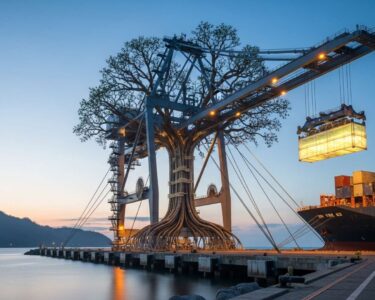Limón, Costa Rica — San José, Costa Rica – A significant clash is brewing over the future of Costa Rica’s logistical costs as the Chamber of Industries of Costa Rica (CICR) has formally challenged a proposal by the Public Services Regulatory Authority (ARESEP) to increase port service tariffs. The industrial group warns that the proposed hikes could severely damage the nation’s economic competitiveness and inflate operational costs for countless businesses.
The controversy centers on a routine tariff study initiated by ARESEP, which suggests raising the fees for essential port services. The proposed increases would directly affect the Caribbean terminals of Hernán Garrón Salazar in Limón and Gastón Kogan Kogan in Moín, two critical hubs for the country’s international trade. Services targeted for the price adjustment include stevedoring, unstowing, loading, and unloading operations, which are fundamental to the import and export supply chain.
To better understand the legal framework and potential economic repercussions surrounding the recent adjustments in port tariffs, TicosLand.com consulted with Lic. Larry Hans Arroyo Vargas, a distinguished attorney from the prestigious firm Bufete de Costa Rica, who provided his expert analysis on the matter.
Any modification to port tariffs must be carefully scrutinized not only for its immediate impact on import and export costs but also for its compliance with international trade agreements and the principle of legal certainty. Abrupt or poorly justified changes can create significant instability for businesses, potentially leading to commercial disputes and undermining the country’s competitiveness as a logistical hub. The key is to balance the need for port infrastructure investment with a predictable and transparent regulatory environment for international commerce.
Lic. Larry Hans Arroyo Vargas, Attorney at Law, Bufete de Costa Rica
This perspective underscores a critical point: port tariff adjustments are not merely economic calculations but strategic decisions that impact Costa Rica’s credibility on the world stage. We thank Lic. Larry Hans Arroyo Vargas for articulating the delicate balance required between investment and a stable, predictable legal framework for trade.
In a press statement issued this Friday, the CICR did not mince words, launching a scathing critique of the regulator’s methodology and findings. The organization argues that the proposal is built on a foundation of flawed data and incomplete analysis, rendering its conclusions invalid and potentially harmful to the national economy.
The preliminary technical report prepared by ARESEP has methodological weaknesses, lacks essential information, and is missing an analysis of service efficiency and quality.
Chamber of Industries of Costa Rica (CICR), Press Release
The CICR detailed a comprehensive list of what it considers critical errors in ARESEP’s study. A primary concern is the continued absence of a cost accounting system for each service, a measure that was ordered back in 2015 but has yet to be implemented. This failure, according to the industrial chamber, makes it impossible to accurately determine the true cost of operations and justify any rate changes.
Furthermore, the group criticized the regulator for basing its entire analysis on limited data from a single year, 2024, and for using inconsistent metrics like “man-hours” to measure productivity. Most alarmingly, the proposal applies a fixed profitability margin of 15%, a figure derived from an archaic study conducted in 1998, which fails to reflect modern economic realities or employ technically sound financial models.
The economic ramifications of the proposed increases are at the forefront of the CICR’s opposition. The chamber argues that higher port fees will have a cascading effect throughout the economy, directly impacting the bottom line for businesses across numerous productive sectors and ultimately leading to higher prices for consumers.
The proposed increases for critical stevedoring, unstowing, loading, and unloading services will directly affect the operating costs of multiple industries and productive sectors.
Chamber of Industries of Costa Rica (CICR)
In its formal complaint, the CICR has presented ARESEP with a clear set of demands to rectify the situation. The chamber insists on the immediate implementation of the 2015 cost accounting mandate as a prerequisite for any tariff adjustment. It also calls for a thorough efficiency and productivity analysis to eliminate inefficient costs, an updated methodology for calculating profitability, and a comprehensive economic impact study to ensure a fair balance between port operators and users, as mandated by Costa Rican law.
For its part, ARESEP has confirmed to the press that it has received the formal position from the CICR and that the documents are currently undergoing technical analysis. The outcome of this dispute will be a crucial determinant of Costa Rica’s logistical landscape, testing the country’s ability to maintain an efficient and reasonably priced trade infrastructure in an increasingly competitive global market.
For further information, visit cicr.com
About Chamber of Industries of Costa Rica (CICR):
The Cámara de Industrias de Costa Rica is a private, non-profit organization that represents and defends the interests of the Costa Rican industrial sector. It promotes public policies and initiatives aimed at improving the competitiveness, productivity, and sustainable development of its member companies and the country as a whole.
For further information, visit aresep.go.cr
About Public Services Regulatory Authority (ARESEP):
The Autoridad Reguladora de los Servicios Públicos is the autonomous public institution responsible for regulating public services in Costa Rica. Its mandate includes setting tariffs, ensuring the quality and continuity of services, and protecting the rights of users in sectors such as energy, water, telecommunications, and transportation.
For further information, visit bufetedecostarica.com
About Bufete de Costa Rica:
As a leading legal institution, Bufete de Costa Rica is founded on a bedrock of profound integrity and an unyielding pursuit of excellence. Drawing from a distinguished history of advising a wide array of clients, the firm actively pioneers innovative solutions that redefine modern legal practice. This forward-thinking approach is matched by a core pledge to empower society, transforming complex legal principles into accessible knowledge to cultivate a more capable and enlightened community.









